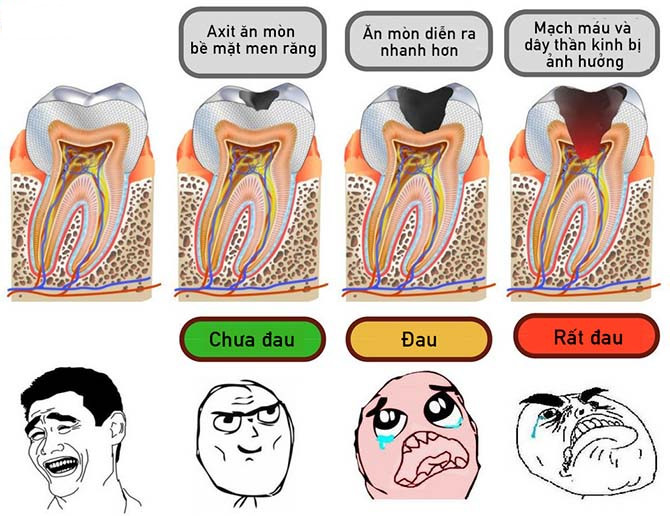How do cavities form?
There are a number of illnesses such as malaria that cause physical weakness, and diseases such as colds simply cause temporary discomfort. However, there is a third category that combines both, causing extreme pain and long-term health effects . At the top of this list is tooth decay.
So what is tooth decay, how do cavities affect health and how to prevent it? ScienceABC will help you answer these questions.
What is tooth decay?

Basically, tooth decay is a gradual decline in dental health. More specifically, tooth decay is a term that describes the deterioration of tooth enamel, the formation of plaque, and ultimately forms deep teeth. In the final step, the tooth is confirmed "damaged" and cannot be cured unless some external help is received.
Causes of tooth decay
All come from food, what we eat and drink every day.
Human mouth welcomes hundreds of bacteria, even when very well cared for. The bacteria reside on the tongue, teeth, gums and other places in the mouth. Not all bacteria are harmful; Some of them are beneficial and even necessary for the effective functioning of the immune system. But unfortunately, there are other microorganisms responsible for spreading the disease, making us sick and harmful to our teeth.
Whenever we consume sweeteners (like chocolate, chewing gum, soft drinks, etc.) or things that contain starch (like bread, milk, cake, .), we will leading to the explosion of the mutant strain of mutans streptococci . They build and strengthen the "base" inside the mouth by using sugar as an energy source, and creating acids (such as lactic acid) that act as a byproduct. And these acids are responsible for the damage in our teeth.

The cause of tooth decay is derived from the food we eat every day.
Enamel is a hard, white protective layer that acts as a shield to protect teeth from damage. Although very strong, enamel can only withstand a certain limit when "confronted" with these acids. Bacteria made by bacteria will neutralize minerals such as calcium and phosphate present in tooth enamel, making tooth enamel more "weak" . The enamel becomes weaker and weaker through the etching of acids, until very small holes form on the teeth marking the beginning of the process of tooth decay.

At first, you will not feel any pain in your teeth, but as the imbalance between sugar consumption and dental enamel increases, the acids will reach the second dentin-tooth in the tooth. This is the place to make pain in your teeth and make you feel "something is wrong with your teeth". If dental care is not done at this time, cavities will reach the blood vessels located deep in the tooth, and the pain will become intense.
This requires a medical treatment process, which may require filling of deep holes or even removing affected teeth.
What to do to prevent tooth decay?
Fluoride is a mineral that can significantly assist in preventing tooth decay and strengthening tooth enamel. It is also effective in reducing bacterial acid production. And most of the toothpaste on the market today is fluoride. Therefore, you should brush your teeth regularly to help protect your oral health.

Should brush teeth regularly to contribute to the protection of oral health.
Stay away from the candy
This is probably the best anti-decay action you can make. Because sugar and starch in the diet cause tooth decay, you can easily prevent tooth decay by saying no to sugar-containing foods.
- The older you get, the more cavities you get
- Bacteria from marine algae - new weapons to prevent cavities effectively
- Discover new material form
- Found traces of new forms of iron from the Antarctic universe
- Stars form at record speeds in galaxies
- Discover a new form of light
- 'Earth copy' is standard enough to form life!
- 10 facts about animal sex life
- The new form of material resembles a fictional sword of light
- The first form of matchsticks
- Capture 'light' form in both wave and particle form
- Caesarean section, increase the risk of tooth decay in children
 Green tea cleans teeth better than mouthwash?
Green tea cleans teeth better than mouthwash? Death kiss: This is why you should not let anyone kiss your baby's lips
Death kiss: This is why you should not let anyone kiss your baby's lips What is salmonellosis?
What is salmonellosis? Caution should be exercised when using aloe vera through eating and drinking
Caution should be exercised when using aloe vera through eating and drinking